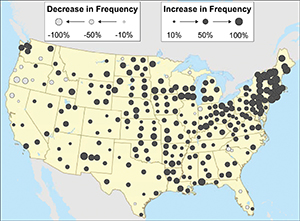Climate Change Is the Elephant in the Room
 |
|
Extreme storms are happening more frequently across much of the US. Source: T. Madsen and N. Willcox, Environment America Research and Policy Center |
Five blind people encounter an elephant. One pats the stubbly flank, another feels the hot breath, a third grasps a bony tusk, another the bristly tail, and yet another the soft winding trunk. They find that their individual observations give completely different impressions of the thing they are trying to describe. I recently talked to a scientist and a corporate official about climate change, and it reminded me of the story about the blind people describing an elephant.
“I use weather data to help growers make management decisions for their crops,” said Glen Koehler, an associate scientist at the University of Maine Cooperative Extension in Orono. He cites a report by the Maine state climatologist that rains over two inches in 24 hours have increased 50 to 100 percent at weather stations across Maine in the last ten years.
“That is a phenomenal difference in just ten years,” Koehler said. “That kind of ‘precipitous’ change has serious consequences for agriculture, roads, drainage culverts, and other things affected by intense rainfall.”
Clouds like the Skin of an Elephant
Eric Ritchie is agriculture manager for the North American operations of McCain Foods Canada. He notes with worry the prospect of potatoes, wet soil, and pathogens.
On September 30, 2015, the forecast called for five inches of rain in 24 hours, with more to follow through rest of the week. This was unwelcome news to potato growers. With 40 percent of the crop harvested, many fields had just had their soil disturbed. Intense rainfall on disturbed soil exacerbates soil erosion, a serious problem for potato fields. And the 60 percent of the potato crop not yet harvested was at risk of sitting in wet soil in fields that could not support harvest equipment for a prolonged period of days.
“If the spuds sit in wet soil too long, rot and anaerobic nastiness can set in,” Ritchie said.
Weather is extremely important to agriculture because it both gives and takes away.
“The growing season up to that point had been nearly perfect,” Ritchie said. “It would have been acutely painful to have torrential rain stress the crop right before harvest, which could cause later storage losses.”
As it turned out, it did rain five inches but the days after the rain were dry, which allowed harvest operations to continue. Ritchie and his team saw a huge crop in some locations.
Feeling the Heat
Fire blight is a fast moving bacterial disease that can quickly devastate an apple orchard. It used to be a non-issue in Maine, according to Koehler. Now it is a required management item for every successful grower.
“Fire blight has long been a major problem in warmer apple growing regions to the south of Maine. With temperatures and fire blight increasing at the same time, it’s easy to suspect a connection to climate change. It’s because climate is so connected to everything else that climate change is so important,” he said.
Parts of the Beast
Potatoes, apples, roads, culverts—and everything else—make up the whole. Things aren’t always as simple as what they seem at first glance. The more you look into it, the more you see that climate change means a lot more than extra days at the beach.
There’s another expression about elephants: the one in the room. The difficult situation that people do not want to talk about.
“Talk is a starting point for action,” said Steve Young, director of the Northeastern IPM Center. “We hope to inspire scientists and growers to formulate IPM strategies that address climate change, because pest pressure is changing, too.”
— by CHRIS GONZALES and GLEN KOEHLER
The Northeastern IPM Center promotes integrated pest management for reducing risks to human health and the environment. If republishing our news, please acknowledge the source (“From Northeast IPM Insights”) along with a link to our website.
